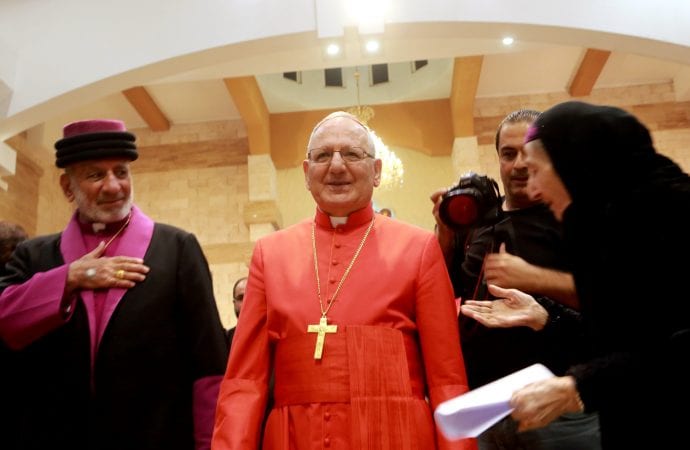Leaders of Iraq’s Christian community have appealed to both Iran and the United States to sort out their problems in ways that don’t further harm minorities in the region, already devastated by the fallout of a 2003 American invasion and its aftermath.
“As tension is increasing in the region, due to our national and ecclesiastical responsibility, we are pleading for the decision-makers of the Islamic Republic of Iran (our neighboring country) and the United States of America to adopt wisdom and appeasement in containing the current conflict,” Sako said in a May 20 statement, sent to both U.S. and Iranian embassies in Baghdad.
Iraq and surrounding areas, ravaged by years of conflict, most recently at the hands of ISIS, “cannot tolerate another catastrophic war in which everyone is the ‘loser,’ especially the innocent and poor,” Sako said, insisting that dialogue is the most effective way to promote “the actual needs of the region,” including peaceful coexistence, mutual respect and good relations among different communities.
Focusing on those aims, Sako said, will not only help the region to achieve stability, but pursuing dialogue rather than conflict will “lead to the peace that the region urgently needs to avoid shedding more blood, but rather to establish security and stability; and to persuade a cultural and economic prosperity for the benefit of people and the development of the country.”
“We in Iraq have to be strengthened exclusively by our shared history and unity that urges us to stand firm with the Iraqi Government, as the only legal and official entity in the country,” he said.
The appeal to the authority of Iraq’s central government is notable, given that many Christian leaders have insisted that aid organizations or foreign governments wanting to help fund reconstruction efforts in northern Iraq bypass the central government due to corruption and political instability.
Sako’s message came after U.S. President Donald Trump on May 15 ordered the evacuation of all non-emergency U.S. employees from the U.S. embassy in Baghdad due to an alleged threat from Iran, although no details about the threat have been released.
Last year Trump withdrew the U.S. from a nuclear deal with Iran and five other world powers on grounds that Iran had allegedly violated terms of the agreement, reinstating previous sanctions.
Tensions began to boil over again earlier this month when the U.S. terminated exemptions from sanctions for countries still in business with Iran. On Sunday, Trump took to Twitter to say, “If Iran wants to fight, that will be the official end of Iran.”
On Tuesday, Archbishop Bashar Warda, Chaldean archbishop of Erbil, issued a warning about a U.S. withdrawal.
“Any pullout of international forces, who are helping the Iraqi army in training and consultations, will create a vacuum,” he said. “God forbid, it will be filled by groups detrimental to the survival of minorities in Iraq.”
“We Christians and Yazidis are the most vulnerable when stability is compromised,” Warda said. “Any further instability will see more Christians leave.”
Erbil is where tens of thousands of Christians and Yazidis fled when ISIS overtook their villages in the summer of 2014. After the defeat of ISIS in 2017, these people have slowly begun to make their way back to their villages, many of which have been burned and entire neighborhoods destroyed, and the reconstruction is far from over.
Despite previous assurances from the Trump administration of its commitment to persecuted minorities in Iraq, Warda said Iraqis, and Christians in particular, “urgently await clarification from the U.S. government concerning its commitments to the endangered minorities of Iraq.”
“We are gravely concerned regarding the recent drawdown of the U.S. presence in Iraq,” he said, saying that after facing the threat of genocide when ISIS swept across the Nineveh Plains in 2014, “our shattered communities have drawn immense hope from the promise of the American commitment to Iraqi minority communities spearheaded by the Vice President.”
U.S. Vice President Mike Pence pledged both in January and June 2018 that the United States would direct significant humanitarian relief to Christians and other persecuted communities in Iraq.
Speaking at Ave Maria University in March, Pence said that, “At President Trump’s direction, for the first time ever, the United States of America is providing direct support to Christians and religious minorities in the Middle East to rebuild their communities.”
“As I stand before you today, we’ve already committed more than $340 million in aid,” he said. However, Christians in Iraq have reported that so far, little of that aid is reaching their communities.

